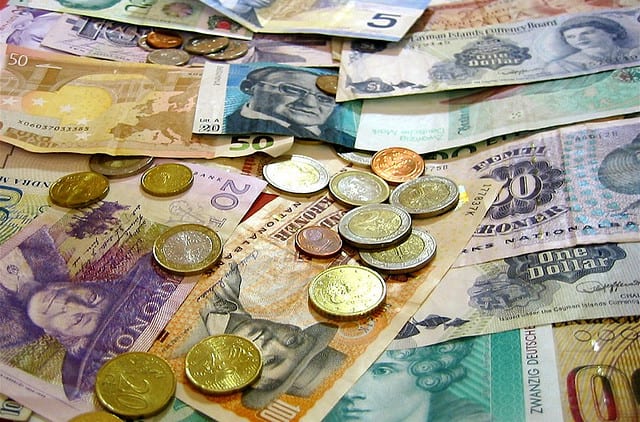
Dear Readers,
The world is losing faith in money. With the onset of the Cyprus banking crisis, Europeans are scrambling to withdraw from their bank accounts.
I really don’t want to talk about this because Cyprus is a small matter when compared to the overall worldwide economic picture. But the mere thought of yet another national bank going under is enough to send shockwaves through the PIGS nations, which will lead to further shockwaves in Europe, and then the rest of the world
For those who aren’t up to speed, let me simplify the situation.
The Cyprus Bank Bailout
Cyprus banks hold 68 billion euros in deposits, including 38 billion in accounts of more than 100,000 euros – that’s a lot of money for an island of 1.1 million people which could never sustain such a big financial system on its own.
Because of its exposure to Greece, the outsized banking sector of Cyprus was crippled and needed bailout funds in the tune of 10 billion euros to avoid bankruptcy. But in order to secure the emergency funds, Cyprus must raise 5.8 billion euros on its own.
In order to come up with the funds, Euro zone finance ministers forced all Cyprus’ savers to pay up to 10 percent of their deposits to raise the 5.8 billion euros; in other words, lose 10% of their savings. Obviously, this is not a favourable outcome for those with money in Cyprus banks.
In order to avoid a possible bank run, the government ordered to shut down all bank doors. Cyprus banks don’t reopen until Tuesday, but when it does, it will have strict capital controls (the first in Eurozone history) to avoid a possible – no, probable – bank run.
Cypriots were outraged by the proposal. The streets overflowed with citizens besieging cash machines to withdraw what they could, only to find most of the machines already emptied. Businesses won’t accept payments by debit and will only take cash. Yet, no one has any cash because the bank machines have been emptied. Imagine its pay day and you can’t be paid because the banks are closed. This is just a small taste of what has happened all of last week in Cyprus.
It was clear that the full levy on all depositors wasn’t going to work. In a non-shocking announcement, Cyprus’ parliament rejected the levy on all depositors calling it a “bank robbery.”
Today (Sunday) marks the last day of talks as Cyprus must come up with a solution to raise the money by tomorrow. Talks from the representatives of the IMF, ECB and European Commission — collectively known as the troika — were centered on a possibly levy of around 25 percent on savings over and above 100,000 euros at failing No. 1 lender Bank of Cyprus. Of course, there were other talks in the works including a “voluntary haircut” that would not require parliamentary approval or an 11-percent levy on big deposits at Bank of Cyprus that would.
If a decision is not made, the Cyprus banks probably have enough money to last them a few days, but no more.
So while a possible levy of 25 percent on savings above 100,000 euros will spare the bulk of the population, what about larger foreign depositors, such as Russia? Russia currently has around £22 billion in deposits in Cypriot banks, accounting for nearly one-third of all deposits in the Cyprus banking system. That’s larger than the GDP of Cyprus.
While that doesn’t seem like much, what happens when investments in Europe, whether held by Russian, Chinese, or any other oligarchs, are pulled out because they fear their money may be used to bailout the insolvent European nations?
According to JPMorgan, the share of large or uninsured deposits is about half of total deposits in the Euro area banking system including the peripheral countries. That’s scary.
For the world’s sake, let’s hope a proper solution is brought to light and that firm commitments to the stability of other European banks are preserved.
As I mentioned earlier, I really don’t want to talk about the Cyprus banking crisis. It’s a small bailout of £10 billion (less than US$13 billion.) Heck, the whole banking system in Cyprus has less than £$70 billion in deposits. I knew about this story last week but chose not to talk about it because it would have little effect on our markets. The proof is in the pudding; US markets didn’t react to Cyprus one bit.
Instead, I chose to talk about Japan last week.
The Greatest Economic Experiment in Modern Era
Japan is about to inflate its way out of a 23-year deflationary spiral in one of the greatest economic experiments in our modern era – second only to the US’ massive QE programs. The big difference? The U.S is three times bigger than Japan in terms of GDP.
The Bank of Japan is expected to expand its 101 trillion yen (US$1.06 trillion) asset buying program by more than 10 million yen. It will also likely start buying Japanese government bonds with remaining maturities of up to five years by removing the upper limit of three years by the end of April.
Japan’s US$1.16 trillion ($1.06 trillion + 10%) stimulus dwarfs Cyprus’ US$13 billion bailout by a long shot. Japan’s expected asset buying program expansion of 10% alone overshadows Cyprus’ bailout by nearly 8 times.
All around the world governments and central banks are expanding the current debt bubble. As a result, the global banking system failures and massive dilution to money are brining light to new forms of wealth protection.
Bitcoin: The World’s Largest Online Currency and The New Currency Movement
Bitcoin, an open-source software code founded in 2009, is a complex and anonymous type of electronic currency that can be swapped for local currencies like dollars, yen and euros.
Users create accounts and use their local cash to buy Bitcoins, at a rate that fluctuates with the supply and demand of the market — just like any other currency. The Bitcoins can be stored in an online wallet, used to make purchases and converted back into local currencies.
The beauty of Bitcoin is that — unlike most currencies that are controlled by central bankers — Bitcoin is highly decentralized with the number of Bitcoins in circulation expanding at a predictable and limited rate. Bitcoin also notes that its accounts cannot be seized by local authorities.
If you think that Bitcoin is simply just a novel idea, think again. This is a New Currency Movement












